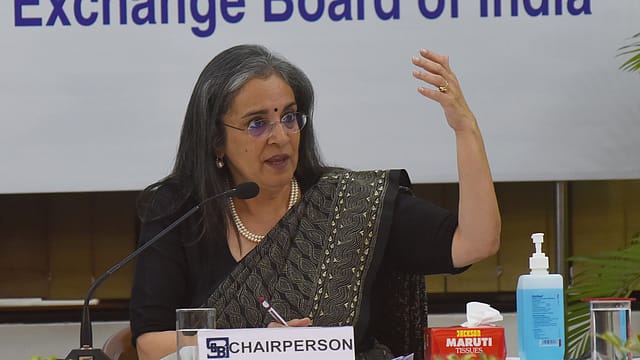SEBI working on over a dozen projects using AI: Madhabi Puri Buch
ADVERTISEMENT

In her first address since the Hindenburg allegations, SEBI Chair Madhabi Puri Buch called for stronger compliance from market infrastructure participants and industry players to foster trust during her keynote address at the Global Fintech Fest on Thursday. Buch revealed that SEBI is working on over a dozen projects using artificial intelligence (AI), with half focused on expediting the approval process.
"The ultimate objective in SEBI is that for every entity that we regulate, compliance should simply be a low hum which goes on in the background, just like we breathe," said Buch during her keynote address at the GFF organised by the Payments Council of India (PCI), National Payments Corporation of India (NPCI), and Fintech Convergence Council (FCC) in Mumbai.
Buch emphasised that compliance and regulation are crucial for fostering trust between businesses and consumers and ensuring protection for investors, particularly, small investors in an environment dominated by large corporations. She also noted that while innovation often occurs in the "grey areas" of regulation, the role of a regulator is to clearly define what falls within acceptable boundaries to facilitate ease of doing business, particularly for fintechs.
January 2026
Netflix, which has been in India for a decade, has successfully struck a balance between high-class premium content and pricing that attracts a range of customers. Find out how the U.S. streaming giant evolved in India, plus an exclusive interview with CEO Ted Sarandos. Also read about the Best Investments for 2026, and how rising growth and easing inflation will come in handy for finance minister Nirmala Sitharaman as she prepares Budget 2026.
“The principle that we as regulators follow is, actually, very simple. If you are doing something that enhances the well-being of the consumer, nine out of ten times, the regulators will say yes and, when the innovation treads the line where the consumer, or in our case the investor is being short-changed or has a lack of concern about what is happening to the investors to those nine out of ten times the regulator will say no,” the chairperson said.
“One other important role for us as regulators in the fintech world in encouraging innovation has been the creation of standards. We have a market ecosystem that has a lot of infrastructure, each different from the other. If there is no standardisation, then the cost of innovation or cost of new fintech to come into our market system and integrate with this market infrastructure is very significant,” she added.
She discussed that SEBI has taken various steps in recent years towards standardisation and infrastructure creation for streamlining processes, such as speeding up initial public offerings (IPOs), approving online bond platforms, and establishing execution-only platforms for mutual funds. She noted that the time taken to approve IPO draft documents has significantly reduced, with most being cleared within three months, now.
Citing the example of Real Estate Investment Trusts (REITs), SEBI Chairperson Madhabi Puri Buch pointed out that the industry itself had proactively sought regulation. She referred to recent norms that bring fractional ownership platforms in real estate under the regulatory scope through Small and Medium Real Estate Investment Trusts (SM REITs).
“They wanted to be regulated. They were operating in an unregulated environment and were suffering from the fact that investors did not have faith and trust in their products and services because it was unregulated,” she said.
